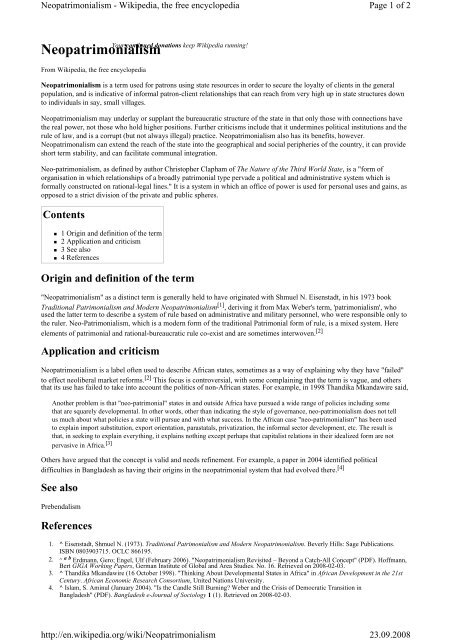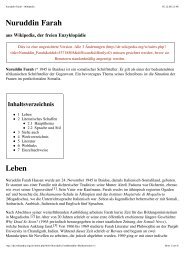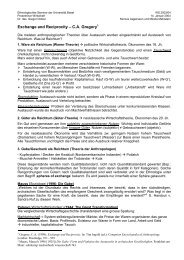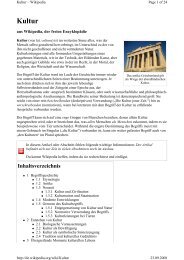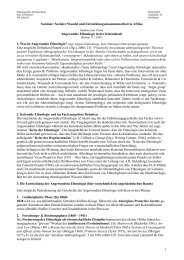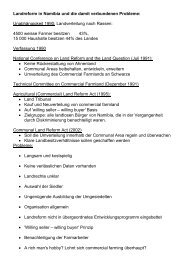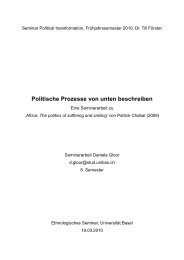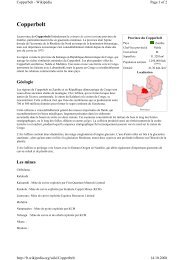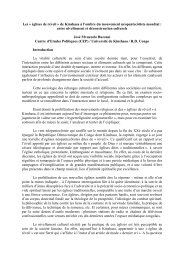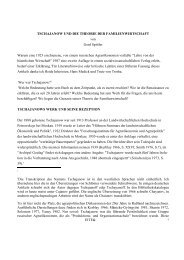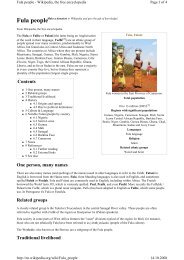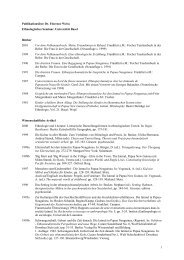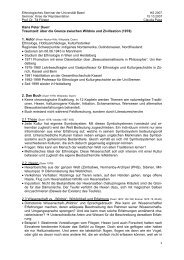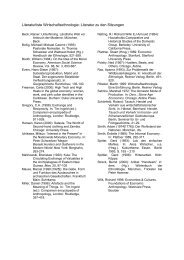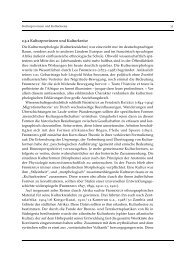Neo-Patrimonialism
Neo-Patrimonialism
Neo-Patrimonialism
Create successful ePaper yourself
Turn your PDF publications into a flip-book with our unique Google optimized e-Paper software.
<strong>Neo</strong>patrimonialism - Wikipedia, the free encyclopedia<br />
http://en.wikipedia.org/wiki/<strong>Neo</strong>patrimonialism<br />
Page 1 of 2<br />
23.09.2008<br />
<strong>Neo</strong>patrimonialism<br />
From Wikipedia, the free encyclopedia<br />
<strong>Neo</strong>patrimonialism is a term used for patrons using state resources in order to secure the loyalty of clients in the general<br />
population, and is indicative of informal patron-client relationships that can reach from very high up in state structures down<br />
to individuals in say, small villages.<br />
<strong>Neo</strong>patrimonialism may underlay or supplant the bureaucratic structure of the state in that only those with connections have<br />
the real power, not those who hold higher positions. Further criticisms include that it undermines political institutions and the<br />
rule of law, and is a corrupt (but not always illegal) practice. <strong>Neo</strong>patrimonialism also has its benefits, however.<br />
<strong>Neo</strong>patrimonalism can extend the reach of the state into the geographical and social peripheries of the country, it can provide<br />
short term stability, and can facilitate communal integration.<br />
<strong>Neo</strong>-patrimonialism, as defined by author Christopher Clapham of The Nature of the Third World State, is a "form of<br />
organisation in which relationships of a broadly patrimonial type pervade a political and administrative system which is<br />
formally constructed on rational-legal lines." It is a system in which an office of power is used for personal uses and gains, as<br />
opposed to a strict division of the private and public spheres.<br />
Contents<br />
• 1 Origin and definition of the term<br />
• 2 Application and criticism<br />
• 3 See also<br />
• 4 References<br />
Origin and definition of the term<br />
"<strong>Neo</strong>patrimonialism" as a distinct term is generally held to have originated with Shmuel N. Eisenstadt, in his 1973 book<br />
Traditional <strong>Patrimonialism</strong> and Modern <strong>Neo</strong>patrimonialism [1] , deriving it from Max Weber's term, 'patrimonialism', who<br />
used the latter term to describe a system of rule based on administrative and military personnel, who were responsible only to<br />
the ruler. <strong>Neo</strong>-<strong>Patrimonialism</strong>, which is a modern form of the traditional Patrimonial form of rule, is a mixed system. Here<br />
elements of patrimonial and rational-bureaucratic rule co-exist and are sometimes interwoven. [2]<br />
Application and criticism<br />
<strong>Neo</strong>patrimonialism is a label often used to describe African states, sometimes as a way of explaining why they have "failed"<br />
to effect neoliberal market reforms. [2] This focus is controversial, with some complaining that the term is vague, and others<br />
that its use has failed to take into account the politics of non-African states. For example, in 1998 Thandika Mkandawire said,<br />
Another problem is that "neo-patrimonial" states in and outside Africa have pursued a wide range of policies including some<br />
that are squarely developmental. In other words, other than indicating the style of governance, neo-patrimonialism does not tell<br />
us much about what policies a state will pursue and with what success. In the African case "neo-patrimonialism" has been used<br />
to explain import substitution, export orientation, parastatals, privatization, the informal sector development, etc. The result is<br />
that, in seeking to explain everything, it explains nothing except perhaps that capitalist relations in their idealized form are not<br />
pervasive in Africa. [3]<br />
Others have argued that the concept is valid and needs refinement. For example, a paper in 2004 identified political<br />
difficulties in Bangladesh as having their origins in the neopatrimonial system that had evolved there. [4]<br />
See also<br />
Prebendalism<br />
References<br />
Your continued donations keep Wikipedia running!<br />
1. ^ Eisenstadt, Shmuel N. (1973). Traditional <strong>Patrimonialism</strong> and Modern <strong>Neo</strong>patrimonialism. Beverly Hills: Sage Publications.<br />
ISBN 0803903715. OCLC 866195.<br />
2. ^ a b Erdmann, Gero; Engel, Ulf (February 2006). "<strong>Neo</strong>patrimonialism Revisited – Beyond a Catch-All Concept" (PDF). Hoffmann,<br />
Bert GIGA Working Papers, German Institute of Global and Area Studies. No. 16. Retrieved on 2008-02-03.<br />
3. ^ Thandika Mkandawire (16 October 1998). "Thinking About Developmental States in Africa" in African Development in the 21st<br />
Century. African Economic Research Consortium, United Nations University.<br />
4. ^ Islam, S. Aminul (January 2004). "Is the Candle Still Burning? Weber and the Crisis of Democratic Transition in<br />
Bangladesh" (PDF). Bangladesh e-Journal of Sociology 1 (1). Retrieved on 2008-02-03.
<strong>Neo</strong>patrimonialism - Wikipedia, the free encyclopedia<br />
http://en.wikipedia.org/wiki/<strong>Neo</strong>patrimonialism<br />
Page 2 of 2<br />
23.09.2008<br />
Retrieved from "http://en.wikipedia.org/wiki/<strong>Neo</strong>patrimonialism"<br />
Categories: Political science terms | Political science stubs<br />
Hidden categories: Politics articles needing expert attention | Articles needing expert attention | Pages needing expert attention<br />
• This page was last modified on 10 September 2008, at 12:08.<br />
• All text is available under the terms of the GNU Free Documentation License. (See Copyrights for details.)<br />
Wikipedia® is a registered trademark of the Wikimedia Foundation, Inc., a U.S. registered 501(c)(3) tax-deductible<br />
nonprofit charity.


